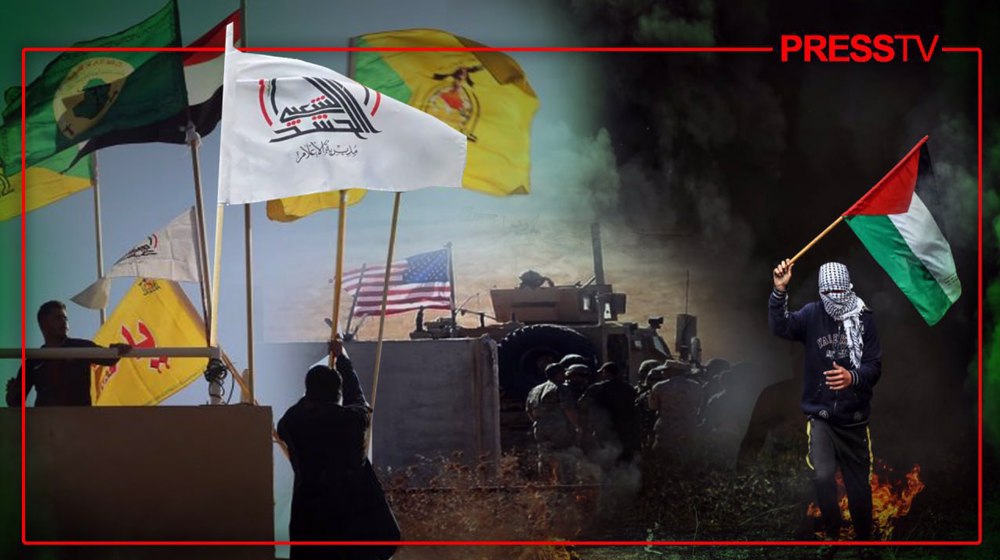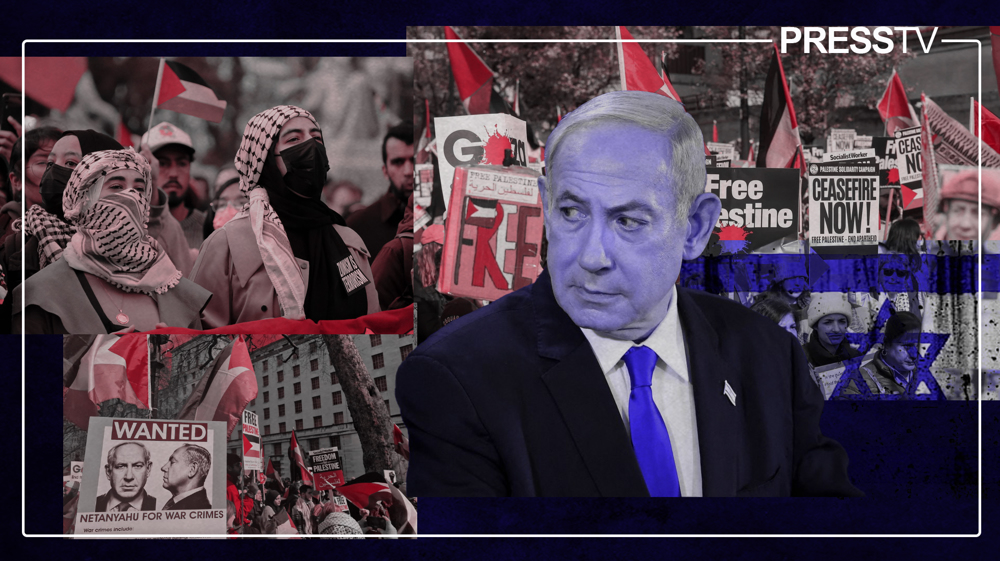Playing with fire: If Israel ups war on Gaza, US bases in Iraq will vanish
By Wesam Bahrani
The US hesitancy to retaliate as its illegal military bases in Iraq and Syria reel under attacks is firstly embarrassing for Washington and secondly a precursor to the full withdrawal of American forces from Iraq in the not-so-distant future.
After more than 60 attacks on American military bases in Iraq and Syria in recent weeks, causing widespread destruction, the Pentagon finally responded last week.
Officials in Washington said the US military occupation deployed an AC-130 gunship, for the first time, to repel an attack on the Ain al-Asad military base, located in western Iraq's Anbar province.
The Islamic Resistance in Iraq claimed responsibility for its latest operation that targeted the US forces stationed at the base.
The attack was believed to be deadly, which forced the US Central Command to order a swift military response for the first time.
US officials were cited by American news outlets as saying that the attack caused injuries and damage to the infrastructure.
Contrary to Western media claims, informed military sources say the injured American soldiers have not reported back to duty.
A post on social media linked to the Islamic Resistance in Iraq published a statement that read:
"In response to the crimes being committed by the enemy against our brothers in Gaza, the Islamic Resistance in Iraq targeted the American occupation's Ain al-Asad base, Western Iraq, and the American occupation's al-Shaddadi base south of al-Hasakah countryside, eastern Syria."
The operation was carried out with "necessary weapons and the two bases were struck with direct hits" the statement added.
For the first time, the Iraqi resistance group used ballistic missiles to attack the base. They were short-range but dangerous.
In another escalation, the US military hit three locations in the area of Jurf al-Nasr, south of Baghdad, killing eight members of Kataeb Hezbollah, also known as the Iraqi Hezbollah brigades.
Kataeb Hezbollah mourned the martyrdom of their members and warned Americans that a stronger response awaits them.
Iraqi Prime Minister Mohammed Shia al-Sudani also condemned US attacks on the Iraqi territory as a violation of the country's sovereignty and territory integrity.
Since the Israeli genocidal campaign in Gaza erupted on October 7, there have been at least 60 drone and missile attacks on US military bases in Iraq and Syria, causing injuries, shock and fear among US forces.
Iraqi resistance movements and political party leaders have slammed the US for being complicit in the Gaza genocide and have openly declared their intentions to strike and decimate illegal American assets in Iraq.
Days after the Israeli onslaught on Gaza, mainly targeting women and children, the leader of Iraq's Badr Organization, Hadi al-Ameri, a veteran Iraqi politician and military commander, warned that "it was time for the international coalition (the majority of whom are US forces) to leave Iraq."
"After a period of calm, the American forces at the Ain al-Assad and Harir bases were targeted by the Islamic resistance factions in Iraq, which is a natural reaction to the bias of America and some European countries toward the usurping Zionist entity," he noted.
The period of calm al-Ameri referred to is an informal agreement between the Iraqi government and the resistance factions, collectively known as the Popular Mobilization Units (PMU), to allow diplomacy over resistance to expel the occupation forces.
Iraqi foreign minister Fuad Hussein says through negotiations with the American side, successive governments have managed to reduce the number of US soldiers by half.
The Joe Biden administration now finds itself in an extremely tricky position.
The period of calm is over.
The PMU has vowed to stand by the Palestinian resistance movement Hamas and the people of Gaza in their struggle against the US-backed Israeli occupation.
As the death toll in Gaza surged close to 15,000, attacks on US bases also increased.
Following the temporary four-day ceasefire between Hamas and the Israeli regime, which was extended by a further two days, there have been no attacks on the US bases.
But if the regime resumes its dastardly bombing campaign on Gaza, attacks on US bases in Iraq and Syria are also likely to resume, and this time, in a more powerful manner.
Biden is fully aware that the Coordination Framework now has the majority of seats in the Iraqi parliament. This alliance includes members of the PMU's political wings, such as the Badr Organization led by al-Ameri or Asa'ib Ahl al-Haq led by Qais al-Khazali.
Their armed resistance factions forced the then-US President Barack Obama to withdraw American forces from Iraq in 2011 after they inflicted tens of thousands of casualties among US military personnel.
Other Iraqi resistance groups, such as Kataib Hezbollah or Harakat al-Nujaba, whilst holding no seats in the country's parliament, share the same anti-American sentiment as the Coordination Framework.
While the Pentagon claims its forces in Iraq play an advisory role in the fight against the Daesh terrorist group, it has been proven time and again that it's a mere eyewash.
The US has been found supporting Daesh sleeper cells and using the terror group as a pretext to occupy Iraq again in 2014.
Among the illegal US military bases in Iraq, there are three that stand out.
The US Embassy
The unusually expansive complex situated in Baghdad's Green Zone is anything but a foreign diplomatic mission.
Thousands of American military personnel use the "diplomatic" space as a base for planning and conducting espionage activities against Iraq and other regional countries.
Ain Al-Assad base
A large military airbase near the border with Syria, which Iran leveled to the ground following the US assassination of top anti-terror commanders, Iran's Lieutenant-General Qassem Soleimani and deputy commander of the PMU, Abu Mehdi al-Muhandis in Baghdad, January 2020.
It is used by the US to instruct its proxy Daesh terror cells to destabilize Iraq and Syria. Another purpose is to sow sedition between the Iraqi Sunni and Shia populations.
Its location, in the largest Sunni province of Anbar and its provincial capital Ramadi, is well suited for these sinister objectives.
There is not one US military base in largely Shia-populated provinces of Iraq.
Al-Harir airbase
In line with US efforts to destabilize Iraq and neighboring Iran, al-Harir airbase in the northern Kurdish province of Erbil is mostly used as a base for anti-Iran operations.
Kurdish terrorists have allowed Israeli spies to operate in the north and assist them in violating the territorial integrity of Iran.
Al-Harir is where some of these operations between Americans, Kurdish terrorists and the Israeli agents are planned out.
These are the main military bases that the US Central Command depends on, for now.
The Biden administration had a pledge from Prime Minister al-Sudani to ensure the safety of American troops in Iraq.
This pledge, or as Iraqis would refer to it a burden, was passed onto al-Sudani from his predecessor, who was deemed as a weaker Prime Minister, Mustafa al-Kadhimi.
The Coordination Framework and the PMU, who are an integral part of the Iraqi armed forces (whether they have representatives in parliament or not), have now scrapped the informal deal to not attack illegal US bases.
Should the Israeli army resume its attacks on the Gaza Strip, the Iraqi resistance will do the same against American bases in the region, with more powerful PMU resistance factions being drawn in.
The Iraqi premier is aware that had it not been for the PMU and its brave fight against Daesh terrorists to liberate the country, there would be no Iraqi government today.
The PMU has the legal mandate to do so, which Washington is fully aware of and for this reason, has tried to refrain from targeting the PMU in order to avoid pulling out of Iraq.
Following the US assassination of General Soleimani and Abu Mehdi al-Muhandis in the vicinity of Baghdad International Airport, several measures took place.
The Iraqi parliament voted unanimously for the expulsion of US forces and, according to the resolution, considered their presence on the Iraqi territory as an occupation.
Whilst the bill was non-binding, it automatically became so when then-Iraqi Prime Minister Adil Abdul-Mehdi stamped it into legislation.
There was also a million-man march in Baghdad to call for the expulsion of US forces. The writing was on the wall: All sections of the Iraqi society want Americans out.
What happened next came to be known as the Tishreen movement.
Months of violent riots and torching of PMU offices and the killing of its members, in what has now been widely documented as a US-backed plot to turn segments of Iraqi society against the PMU.
It also led to the resignation of Adul Abdul-Mehdi, who attended the funeral ceremonies for General Soleimani and Abu Mehdi al-Muhandis.
The Pentagon views its bases in Iraq as an expansion of its hegemony in West Asia.
The ongoing attacks on its military bases have proved a headache for Washington. With more than 60 operations in Iraq and Syria in less than seven weeks, it simply does not have the prowess to strike back.
It would rather hold on to much larger naval, air and ground bases scattered across the Persian Gulf, as opposed to being attacked on a daily basis in Iraq and Syria without having the forces and resources to respond.
Before attacking Iraq, CENTCOM had authorized only three strikes on Syrian territory, knowing it could not afford an escalation with the Iraqi resistance.
The Washington Post cited US officials in the US Defense Department as being strongly frustrated by what they considered "an incoherent strategy" in dealing with and failing to deter the attacks.
"There’s no clear definition of what we are trying to deter," one official was quoted as saying. "It's clearly not working."
All of this makes one thing crystal clear: If the Israeli war on Gaza escalates, US ground bases in Iraq will vanish, along with the American embassy in the Iraqi capital Baghdad.
Wesam Bahrani is an Iraqi journalist and commentator.
(The views expressed in this article do not necessarily reflect those of Press TV.)
‘Narcissistic psychopath’: Netizens mock Trump over letter to Norway PM on Nobel Prize
Israeli forces demolish UNRWA buildings in occupied East al-Quds
Trump lashes out at allies over Greenland, shares private texts online
Iran’s Armed Forces will cut off any 'hand of aggression' against Leader: Spokesman
VIDEO | Foreign hands, failed chaos
Russia’s Lavrov condemns Western plots for ‘regime change’ in Iran
‘No natural uprising’: Prominent global voices on US-Israeli role in engineering Iran riots
Trump threatens 200% wine tariffs on France to push Macron to join Gaza board










 This makes it easy to access the Press TV website
This makes it easy to access the Press TV website